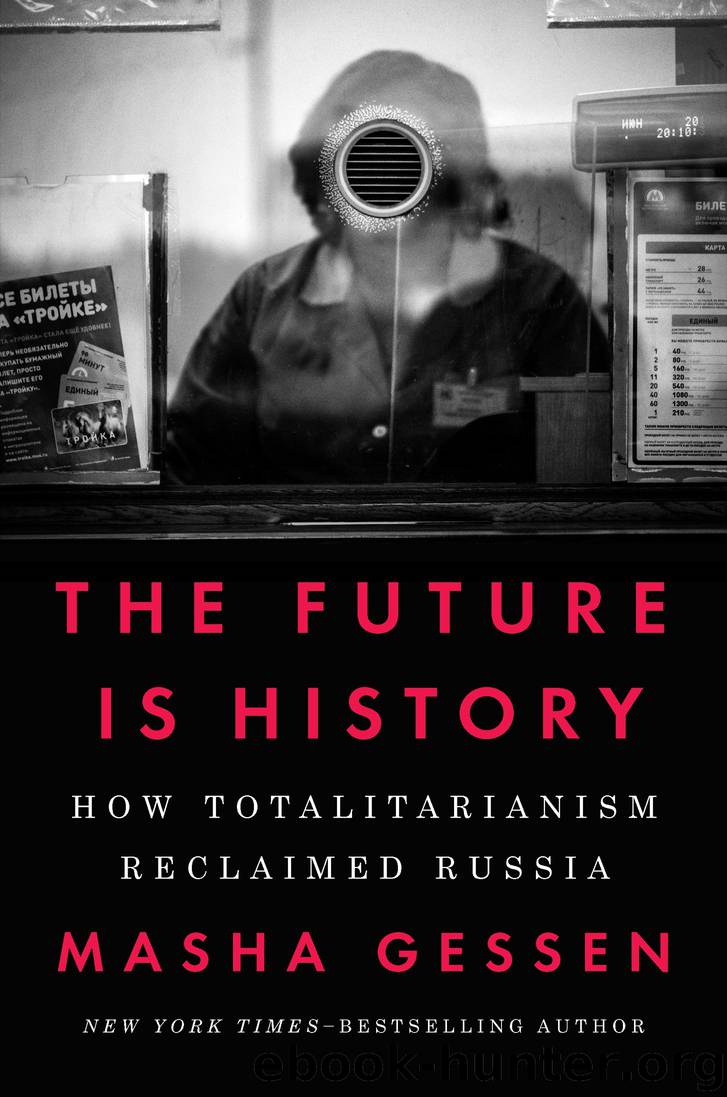The Future Is History by Masha Gessen

Author:Masha Gessen
Language: eng
Format: epub
Publisher: Penguin Publishing Group
Published: 2017-10-03T04:00:00+00:00
The format of the conference enables me to avoid superfluous politesse, the need to speak in smooth, pleasant, and empty diplomatic clichés. The format of the conference allows me to say what I really think about international security issues.37
Conference participants, who included German chancellor Angela Merkel and U.S. defense secretary Robert Gates, were taken by surprise: it seemed no one had expected a confrontation.38 Putin railed against NATO’s acceptance of new members:
I think it’s obvious: the process of NATO enlargement has nothing to do with the modernization of the alliance itself or with raising the level of security in Europe. Just the opposite: it is a seriously inflammatory factor that lowers the level of mutual trust. And we have a justified right to ask openly: Who is NATO enlarging against? And what happened to the assurances given by Western partners after the Warsaw Pact was dissolved? What happened to those declarations? No one even remembers them. But I will dare remind the audience of what was said. I’d like to quote from NATO Secretary-General Wörner’s speech in Brussels on May 17, 1990. He said then: “The very fact that we are ready not to deploy NATO troops beyond the territory of the Federal Republic [of Germany] gives the Soviet Union firm security guarantees.” Whatever happened to those guarantees?39
The quote indeed came from a speech by NATO Secretary-General Manfred Wörner, but it had hardly amounted to the promise Putin was saying had been betrayed. First, Wörner had been careful to use vaguely conditional language: he had said that NATO was “ready not to” expand—not that it would never expand. More important, the conditional guarantee he appeared to be extending applied to the Soviet Union, a country that ceased to exist a year and a half later. Russia was now separated from Germany by a double belt: a ring of former Soviet constituent republics—Ukraine, Belarus, and the Baltic states—and then a ring of former Warsaw Pact countries—Poland, Slovakia, Czech Republic, and others. A clear majority of these countries had, in the intervening years, explicitly asked—and sometimes begged and pleaded—for NATO protection.
Documents that were declassified in the United States around the time of Putin’s Munich speech provided the context for the Wörner statement. It had been made in the midst of multilateral talks on German reunification, which lasted from February to July 1990. The Soviet Union wanted to see Germany neutral—part of neither NATO nor the Warsaw Pact; NATO and the new German government, elected after the collapse of the Berlin Wall, wanted to see Germany a full NATO member. In the final agreement, Germany became—or, some might say, remained—a NATO member but former East German territory remained free of NATO military presence. Wörner’s statement, like the negotiations from which it stemmed, had nothing to do with the issue of NATO expansion to former Warsaw Pact countries, because the participants assumed at the time that the Warsaw Pact would continue to exist (it dissolved a year and a half later, in March 1991).40
Download
This site does not store any files on its server. We only index and link to content provided by other sites. Please contact the content providers to delete copyright contents if any and email us, we'll remove relevant links or contents immediately.
| Anthropology | Archaeology |
| Philosophy | Politics & Government |
| Social Sciences | Sociology |
| Women's Studies |
The Secret History by Donna Tartt(16618)
The Social Justice Warrior Handbook by Lisa De Pasquale(11489)
Thirteen Reasons Why by Jay Asher(7786)
This Is How You Lose Her by Junot Diaz(5768)
Weapons of Math Destruction by Cathy O'Neil(5034)
Zero to One by Peter Thiel(4823)
The Myth of the Strong Leader by Archie Brown(4789)
Promise Me, Dad by Joe Biden(4444)
Stone's Rules by Roger Stone(4415)
Beartown by Fredrik Backman(4413)
How Democracies Die by Steven Levitsky & Daniel Ziblatt(4397)
The Fire Next Time by James Baldwin(4341)
100 Deadly Skills by Clint Emerson(4076)
A Higher Loyalty: Truth, Lies, and Leadership by James Comey(4031)
Rise and Kill First by Ronen Bergman(4012)
The David Icke Guide to the Global Conspiracy (and how to end it) by David Icke(3881)
The Farm by Tom Rob Smith(3871)
Secrecy World by Jake Bernstein(3782)
The Doomsday Machine by Daniel Ellsberg(3730)
